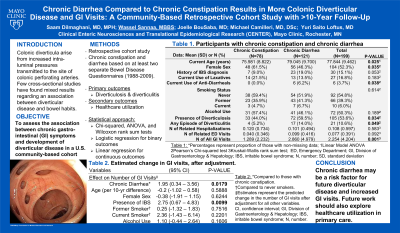Tuesday Poster Session
Category: Colon
P3013 - Chronic Diarrhea Compared to Chronic Constipation Results in More Colonic Diverticular Disease and GI Visits: A Community-Based Retrospective Cohort Study With >10-Year Follow-Up
Tuesday, October 24, 2023
10:30 AM - 4:00 PM PT
Location: Exhibit Hall

Has Audio
- SD
Saam Dilmaghani, MD, MPH
Mayo Clinic
Rochester, MN
Presenting Author(s)
Saam Dilmaghani, MD, MPH, Wassel Sannaa, MBBS, Joelle BouSaba, MD, Michael Camilleri, MD, DSc, Yuri Saito Loftus, MD
Mayo Clinic, Rochester, MN
Introduction: Colonic diverticula are generally thought to arise from increased intra-luminal pressures. Few cross-sectional studies have found mixed results regarding an association between diverticular disease and bowel habits. We assessed the association between objective documentation of diverticular disease among a community-based cohort of patients with chronic gastrointestinal (GI) symptoms.
Methods: We conducted a retrospective population-based cohort study of non-deceased patients with chronic constipation and chronic diarrhea, defined as reporting symptoms on at least two separate Bowel Disease Questionnaires (BDQ) from 1988 to 2009. Outcomes included objective diverticulosis as documented in the medical record (EMR) via notes, endoscopy, radiography, or complications. Healthcare utilization was summarized as number of hospitalizations for diverticular diseases, Emergency Department (ED) visits for diverticular diseases, and any GI visits. Differences between groups were assessed using the Chi-squared test for categorical variables and ANOVA or Wilcoxon rank sum test for continuous variables. Logistic regression assessed the association between diverticular disease and chronic GI symptoms. Linear regression estimated the predictors of larger numbers of GI visits.
Results: The demographics, prevalence of diverticulosis, diverticulitis, and healthcare utilization of 199 patients who had completed at least 2 BDQ at a single tertiary referral center are reported in Table. Seventy-eight patients reported chronic constipation and 121 had chronic diarrhea. Those with chronic diarrhea were more likely older and female. Those with chronic diarrhea were more likely to have evidence of diverticulosis (p=0.034), diverticulitis (p=0.049), and greater number of GI visits (p=0.001) compared to those with chronic constipation. There were no observed differences in rates of hospitalizations or ED visits between the groups. Predictive models showed that patients who were older (p=0.0437) and male (p=0.0279) had increased risk of having diverticulosis after adjustment for all other variables. Patients with chronic diarrhea (p=0.0179) and a diagnosis of irritable bowel syndrome (p=0.0099) had higher number of GI visits after adjustment for all other co-variates.
Discussion: Chronic diarrhea was more likely to be associated with future diverticular disease and with more GI visits, but there were no differences in hospitalizations or ED visits.
Disclosures:
Saam Dilmaghani, MD, MPH, Wassel Sannaa, MBBS, Joelle BouSaba, MD, Michael Camilleri, MD, DSc, Yuri Saito Loftus, MD. P3013 - Chronic Diarrhea Compared to Chronic Constipation Results in More Colonic Diverticular Disease and GI Visits: A Community-Based Retrospective Cohort Study With >10-Year Follow-Up, ACG 2023 Annual Scientific Meeting Abstracts. Vancouver, BC, Canada: American College of Gastroenterology.
Mayo Clinic, Rochester, MN
Introduction: Colonic diverticula are generally thought to arise from increased intra-luminal pressures. Few cross-sectional studies have found mixed results regarding an association between diverticular disease and bowel habits. We assessed the association between objective documentation of diverticular disease among a community-based cohort of patients with chronic gastrointestinal (GI) symptoms.
Methods: We conducted a retrospective population-based cohort study of non-deceased patients with chronic constipation and chronic diarrhea, defined as reporting symptoms on at least two separate Bowel Disease Questionnaires (BDQ) from 1988 to 2009. Outcomes included objective diverticulosis as documented in the medical record (EMR) via notes, endoscopy, radiography, or complications. Healthcare utilization was summarized as number of hospitalizations for diverticular diseases, Emergency Department (ED) visits for diverticular diseases, and any GI visits. Differences between groups were assessed using the Chi-squared test for categorical variables and ANOVA or Wilcoxon rank sum test for continuous variables. Logistic regression assessed the association between diverticular disease and chronic GI symptoms. Linear regression estimated the predictors of larger numbers of GI visits.
Results: The demographics, prevalence of diverticulosis, diverticulitis, and healthcare utilization of 199 patients who had completed at least 2 BDQ at a single tertiary referral center are reported in Table. Seventy-eight patients reported chronic constipation and 121 had chronic diarrhea. Those with chronic diarrhea were more likely older and female. Those with chronic diarrhea were more likely to have evidence of diverticulosis (p=0.034), diverticulitis (p=0.049), and greater number of GI visits (p=0.001) compared to those with chronic constipation. There were no observed differences in rates of hospitalizations or ED visits between the groups. Predictive models showed that patients who were older (p=0.0437) and male (p=0.0279) had increased risk of having diverticulosis after adjustment for all other variables. Patients with chronic diarrhea (p=0.0179) and a diagnosis of irritable bowel syndrome (p=0.0099) had higher number of GI visits after adjustment for all other co-variates.
Discussion: Chronic diarrhea was more likely to be associated with future diverticular disease and with more GI visits, but there were no differences in hospitalizations or ED visits.
Disclosures:
Saam Dilmaghani indicated no relevant financial relationships.
Wassel Sannaa indicated no relevant financial relationships.
Joelle BouSaba indicated no relevant financial relationships.
Michael Camilleri: NGM Biopharmaceuticals – Grant/Research Support.
Yuri Saito Loftus indicated no relevant financial relationships.
Saam Dilmaghani, MD, MPH, Wassel Sannaa, MBBS, Joelle BouSaba, MD, Michael Camilleri, MD, DSc, Yuri Saito Loftus, MD. P3013 - Chronic Diarrhea Compared to Chronic Constipation Results in More Colonic Diverticular Disease and GI Visits: A Community-Based Retrospective Cohort Study With >10-Year Follow-Up, ACG 2023 Annual Scientific Meeting Abstracts. Vancouver, BC, Canada: American College of Gastroenterology.
